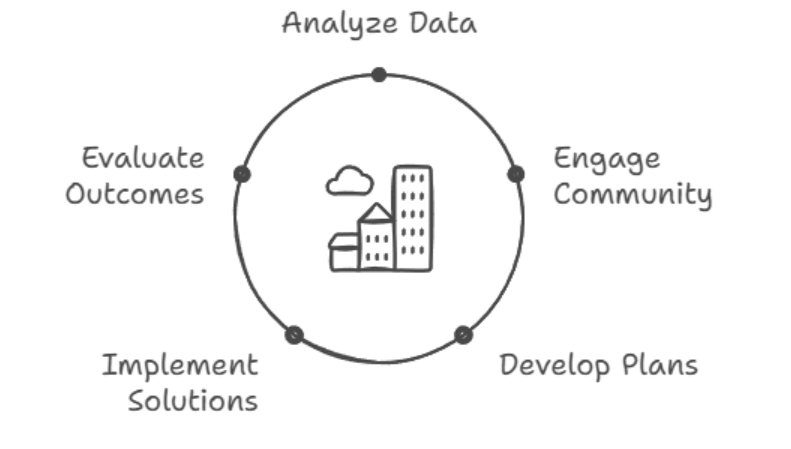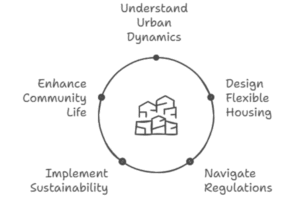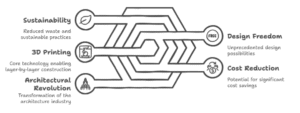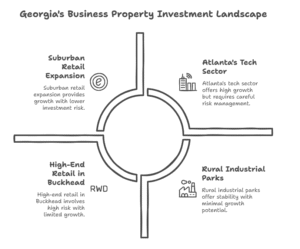
Ever find yourself looking at a cityscape and thinking, “This could be so much better?” That’s the kind of question that fuels urban planners like myself every single day. We’re the folks thinking about how to shape the future of our communities, working to make them dynamic, equitable – and, crucially, sustainable – places for everyone to live and yes, even thrive.
I remember early in my career, being involved in a revitalization project in a struggling downtown district. Seeing the transformation unfold-new businesses opening up, residents actually using the re-designed public spaces, an overall sense of community re-emerging-that’s when the real power of meticulously thought out and executed urban planning really hit home.
If you’re drawn to tackling complex problems, love the idea of shaping the world around you, and maybe even harbor a bit of a “big picture” vision, then this field just might be your calling. It’s about more than just buildings and roads; it’s about people. We have the responsibility of contributing to equitable communities.
2. What Is Urban Planning, Anyway?
So, what is urban planning, exactly? Stripped down, it’s the art and the science, frankly, of shaping the physical environment of cities, towns, and even entire regions. The scope is incredibly broad, touching everything from land use regulations and optimal transportation planning to housing strategies, critical infrastructure development, and yes, even the vital task of environmental conservation.
The overarching goals are pretty straightforward. We aim to create sustainable communities, build truly livable cities, and promote equitable development opportunities for all residents, regardless of their background or socioeconomic status. This is an underlying mission of mine.
Now, I want to tackle a really common misconception: urban planning isn’t just about zoning. Zoning regulations are a tool, sure, but they’re just one relatively small piece of a much, much larger puzzle. Zoning should stem from thorough comprehensive planning efforts. Our work relies on analyzing mountains of data, engaging directly with the public to understand their needs and aspirations, creating long-term visions and strategic plans, developing detailed policies, and then, of course, managing the practical implementation of complex projects. Maybe I should have mentioned communication as an essential skill!
Ultimately, at its heart, urban planning is about creating a better future for our communities. It’s about anticipating the challenges that lie ahead, resourcefully finding creative and innovative solutions, and working collaboratively with a wide range of stakeholders to build inclusive and thriving places where people can truly prosper. And this requires careful consideration and collaboration.
3. Is Urban Planning the Right Path For You?
So, you’re intrigued? Great! But how do you actually know if a career in urban planning is the right path for you? It’s a question I get asked a lot, actually, especially by students. Let’s dig into some of the key interests, core skills, and underlying values that often align with success in this demanding, but ultimately rewarding, field.
First things first: Are you genuinely fascinated by problem-solving, especially if those problems are complex and directly impact communities and people’s lives? Do you actually enjoy analyzing data-sometimes lots of it-and using that data to make reasoned, well-informed decisions? Are you a strong communicator, equally comfortable with the written word and speaking in front of diverse groups of people? If you answered “yes” to most of these, then you’re definitely heading in the right direction.
My own interest in planning started, honestly, from a pretty deep-seated desire to address social inequality. I witnessed disparities growing up which is, quite frankly, that is unacceptable. Turns out a lot of us in the field share that same sense of commitment to making things fairer.
I remember one particularly thorny problem I tackled way back involved redesigning a seriously dangerous intersection notorious for pedestrian accidents. By carefully analyzing traffic patterns, detailed pedestrian volume data, and gathering extensive community feedback (through workshops and surveys, of course), I lead the team in creating a safer, more accessible space for everyone. It took solid analytical skills, clear communication, and a whole lot of creative problem-solving, but the outcome was incredibly satisfying.
Long story short – if you are passionate about making a positive impact, actively improving the world around you, and possess the analytical and communication skills to back it up, urban planning is a pretty interesting path.
4. Your Education: The Path to Becoming a Planner
Okay, so you’re sold on the idea? Fantastic! Now, let’s map out the educational journey you’ll likely need to take. While some entry-level roles might be open to individuals with a relevant bachelor’s degree (think geography, environmental studies, or the like), a master’s degree in urban planning (or a closely related field, like urban design or regional planning) is generally considered the gold standard – and often a must-have.
A strong undergraduate foundation in, say, architecture, geography, political science, or even sociology can be a solid starting point. The goal then is to set your sights on a reputable Master’s program.
When I was wading through my own planning education, I dove headfirst into courses like GIS (Geographic Information Systems, which are genuinely indispensable these days), transportation planning, land use law, real estate development, local government economics, and public policy analysis. Trust me: it was a lot, but the curriculum gave me a solid base. Courses even covered sustainable development.
And, you just can’t underestimate the value of internships. Think of them as critical, real-world dress rehearsals for the profession. I landed an internship with a local planning agency during my studies, which helped me with the daily reality of being a planner and connected me. Networking is invaluable.
After clocking several years of solid professional experience, consider (strongly) pursuing AICP certification. This is not always required, not unless it’s explicitly stated in a job posting. Think of it as an extra credential. The American Planning Association (APA) oversees the certification process. Eligibility means passing a comprehensive exam. While it might not be mandatory, it will make you a much stronger candidate. AICP was a goal of mine. So, I would highly recommend it.
5. Specializations: Where Do You Fit?
One of the things I’ve always loved about urban planning-and this is something I’ve seen evolve quite a bit even in my own career-is the sheer diversity of specializations available. It’s not a one-size-fits-all profession; there are niche areas to explore:
- Transportation Planning: This is all about designing and managing transportation networks and systems, with the core goals of maximizing efficiency, ensuring public safety, and-increasingly-promoting environmental sustainability. People working in transportation might be designing bike lanes, revamping transit networks, or trying to optimize traffic flow using cutting-edge technology. I lead a bus rapid project, and it was so complex!
- Land Use Planning: This deals with zoning regulations, comprehensive plans, and policies for guiding development. I worked to rezone an area for mixed use, that helped reduce reliance on cars.
- Environmental Planning: This is integrating environmental concerns into the planning decision-making process. Think environmental impact assessments for construction projects or developing strategies to protect sensitive natural resources and promote sustainable development practices. A highway project helped me implement mitigation strategies.
- Community Development: This focuses on building better lives for people. Think things like community revitalization. Early in my career I worked on a neighborhood, and it was a very rewarding experience.
- Urban Design: Emphasizes streets, public spaces, and aesthetics.
- Economic Development: Seeks to bring investment to communities. Economic development frequently involves public-private-partnerships.
If you’re thinking ahead , it is critical to think about what you may desire to focus on, so you know which courses to prioritize.
6. Skills: The Urban Planner’s Toolkit
To truly thrive as an urban planner, you’ll need a diverse toolkit of core skills. It’s not just about regurgitating textbook definitions.
- Analytical Skills: It’s all about interpreting complex data sets, spotting underlying trends, and making well-reasoned, evidence-based decisions. (Demographic projections).
- Communication Skills: It’s essential for explaining complex information to diverse audiences, from community members who may not have any background in planning to elected officials who have to make the final decisions. I had a problem with community groups once, and it was really based on clear communication that I was able to make headway.
- Problem-Solving Skills: This involves addressing congestion or affordable housing. A blighted downtown revitalization combined land use, transportation and community engagement, and it involved countless stakeholders.
- Technical Skills: Proficiency in GIS (Geographic Information Systems) is almost completely non-negotiable. Proficiency in CAD as well as understanding statistics are also helpful technical skills. I still lean on GIS daily, it’s that important!
Beyond all of the things above, negotiation and public speaking are beneficial too! You will use these skills often, believe me.
7. Job Hunt: Navigating the Market
You’ve got the education, the skills, so now it’s finally time to tackle that job search! The urban planning job market can be competitive, no question about it, but with the right strategic approach, you can significantly increase your chances of landing that dream job and setting yourself up for career advancement.
First impressions matter, so your urban planning resume must shine. Tailor it to each and every specific job description, making sure to prominently highlight your most relevant skills and related experience. And critically, whenever possible, quantify your accomplishments, which can set you apart. For example, instead of simply saying “Improved traffic flow,” say “Reduced peak-hour traffic congestion by 15% along Main Street.” And always be sure to include any experience you have with GIS software.
Networking is also absolutely HUGE in this field. Attend industry conferences (even virtual ones!), join professional organizations (like that American Planning Association I mentioned), and actively connect with established planners on LinkedIn. Don’t be afraid to reach out to planners who are working in areas that particularly interest you for informal informational interviews – most people are happy to share their experiences.
And finally, ace that urban planning interview! Thoroughly research the organization you’re interviewing with and make sure you have a solid understanding of their ongoing projects. Think carefully about how your unique skills and experiences directly align with their specific needs. Brush up on some of those common interview questions. Project examples should also be something to think about.
I found during my own job search that showing passion is the most compelling! When people can see your interest, you really stand out among other candidates. And most importantly: believe in yourself!
8. My Journey: A Bit of My Own Story
My own experience as an urban planner has been nothing short of a rollercoaster ride – one filled with genuinely incredible rewards, a healthy dose of daunting challenges, and incredibly invaluable lessons learned along the way. Honestly, reflecting on my own career path is often a helpful reminder of the hard work and sheer persistence required for success.
One particularly challenging project involved working with a community deeply and emotionally divided over the proposed construction of a new affordable housing complex that was controversial and opposed. There were strong (and often very vocal) concerns about increased traffic congestion, declining property values, and the potential impact on the overall character of the existing neighborhood. However, by making a concerted effort to genuinely listen to each and every resident’s concerns and working closely and collaboratively with experienced city staff, we ultimately earned buy-in, and the project became a demonstrable success.
It taught me about empathy, patience, and the real definition of genuine community – which actually sounds like a cliché when I type it, but it’s absolutely true. The completed complex is now a thriving part of the wider neighborhood, and residents are enjoying it.
It’s been full of continuous professional development and personal growth. You know, if I were to offer a single piece of career advice, it would be this: never, ever stop learning, and always stay open to fresh new perspectives. The ever-evolving field of modern urban planning is constantly changing, you have to stay curious and adaptable.
9. Future: What’s on the Horizon?
The future of urban planning is dynamic and getting intense. You see all the challenges. So embracing new technologies and approaches will be essential for creating resilient, that are equitable, as well as sustainable.
Sustainability will be at the forefront, with planners prioritizing energy efficiency, green infrastructure, and reduced carbon emissions. Smart cities, powered by data and technology, optimizing resource management is easier. Community engagement will remain central, needs and aspirations should be at the forefront.
I predict we will need to be flexible above all moving forward. Challenges are ever changing, as noted on medium.com.
10. Conclusion: Your Planning Career Awaits
So, there you have it – a comprehensive, (hopefully) insightful overview of the vibrant world of urban planning! From understanding the core principles and exploring diverse specializations to building essential skills and navigating the job market, I truly hope this guide has provided valuable insights to those who are thinking about becoming a planner.
If you’re genuinely passionate about creating better, more equitable and sustainable communities and making a positive impact on the world around you, then I want to encourage you to take that next important step. Explore your interests, start developing your skills, and embrace the challenges (and of course, the many rewards!) that eagerly await you. The future of our cities is, after all, in your capable hands!


